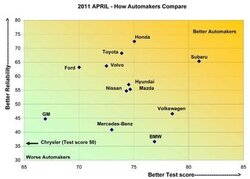B
BrianK
Guest
http://www.bizjournals.com/nashville/blog/2012/04/savings-come-slowly-for-hybrid.html
Savings come slowly for hybrid, electric car owners
Nashville Business Journal by Nevin Batiwalla, Staff Reporter
Date: Thursday, April 5, 2012, 12:09pm CDT
If you're thinking about buying a fuel-efficient hybrid, electric or otherwise eco-friendly vehicle as a way to save money over time, do your homework — or be prepared to wait.
Buyers who choose Nissan's all-electric Leaf ($28,421) over its approximate gas-powered equivalent, Nissan's Versa ($18,640), will likely wait nearly 9 years until they break even, according to a new report by The New York Times that examines the cost of fuel efficiency.
For drivers of the Chevrolet Volt ($31,767), the wait is even longer— 26.6 years.
A few vehicles begin paying off relatively soon after leaving the dealership. Two hybrids— Toyota's Prius ($23,537) and Lincoln's MKZ ($33,887)— as well as Volkswagen's diesel-powered Jetta TDI ($25,242) all take less than two years before they start saving their owners money.
Check out this chart by the Times that breaks down the savings delay for many popular fuel-efficient models.
The high price tag of many fuel-efficient vehicles — including the Nissan Leaf, which will soon be made in Smyrna, Tenn. — is one reason consumers have yet to embrace them with open arms.
Savings come slowly for hybrid, electric car owners
Nashville Business Journal by Nevin Batiwalla, Staff Reporter
Date: Thursday, April 5, 2012, 12:09pm CDT
If you're thinking about buying a fuel-efficient hybrid, electric or otherwise eco-friendly vehicle as a way to save money over time, do your homework — or be prepared to wait.
Buyers who choose Nissan's all-electric Leaf ($28,421) over its approximate gas-powered equivalent, Nissan's Versa ($18,640), will likely wait nearly 9 years until they break even, according to a new report by The New York Times that examines the cost of fuel efficiency.
For drivers of the Chevrolet Volt ($31,767), the wait is even longer— 26.6 years.
A few vehicles begin paying off relatively soon after leaving the dealership. Two hybrids— Toyota's Prius ($23,537) and Lincoln's MKZ ($33,887)— as well as Volkswagen's diesel-powered Jetta TDI ($25,242) all take less than two years before they start saving their owners money.
Check out this chart by the Times that breaks down the savings delay for many popular fuel-efficient models.
The high price tag of many fuel-efficient vehicles — including the Nissan Leaf, which will soon be made in Smyrna, Tenn. — is one reason consumers have yet to embrace them with open arms.


